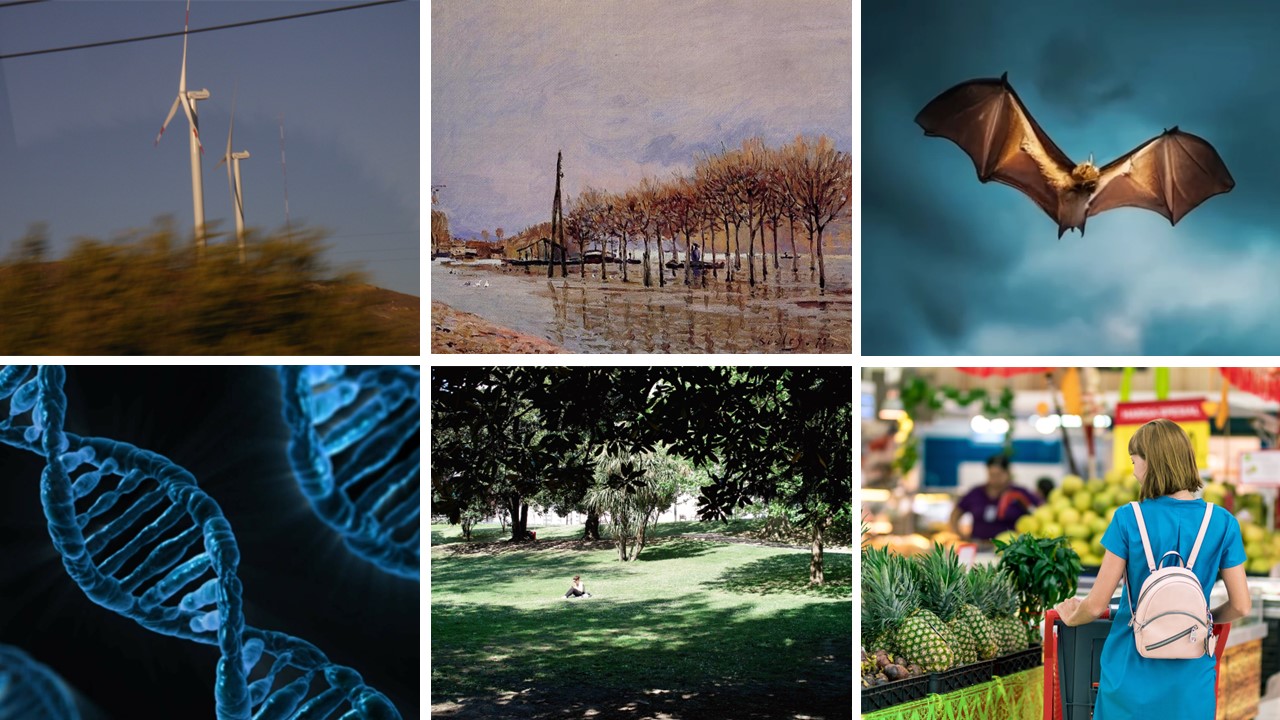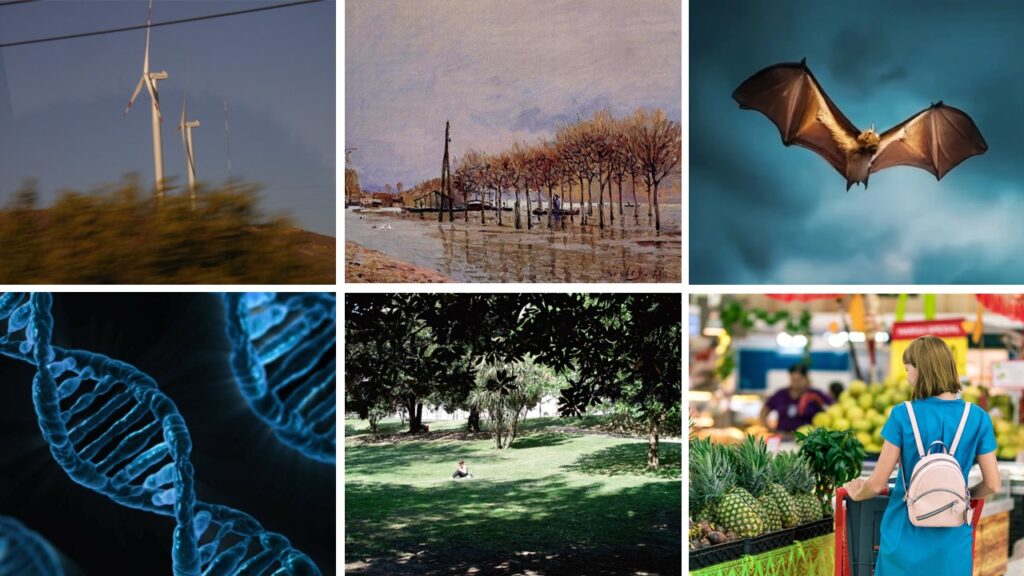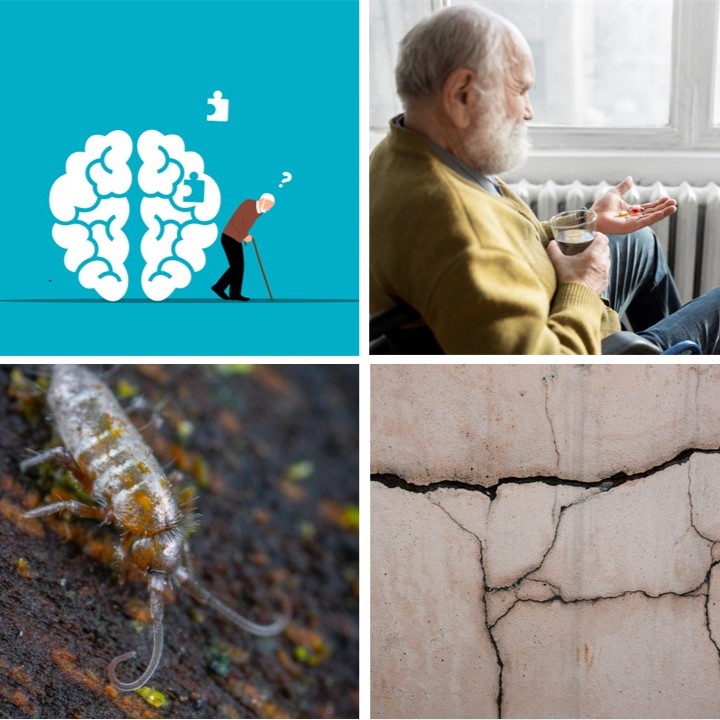10 selected Research Luxembourg results – December 2023
09 January 2024

Luxembourg News in Science & Research
A method for predicting mega-floods; an unknown earthworm; a protein that protects our genes; the impact of urban green spaces on our health: here are the latest scientific news from Luxembourg.
Flickr (Sisley); Pixabay; Craiyon (Diane Bertel)
This article was originally in French and German on science.lu
Can we predict the risk of a mega-flood?
Luxembourg Institute of Science and Technology (LIST)
Following the massive floods in Europe in 2021, which resulted in over 200 deaths, a comprehensive research initiative led by the Vienna University of Technology, with contributions from LIST, has made a significant revelation: large-scale floods haven’t changed much over time across the entire European continent.
The new prediction approach described in the study involves drawing insights from areas with comparable climatic and hydrological characteristics, allowing for the anticipation of future mega-floods. The researchers demonstrated that the flooding in the Rhine basin in 2021 falls within the expected range when continental data is taken into account.
This study encompassed, for the first time, such a vast dataset. Over 8,000 gauge stations were examined, including the one in Luxembourg, covering the years 1810 to 2021 across Europe.
To the press release / To the publication
What is the role of urban green spaces on our health?
Luxembourg Institute of Socio-Economic Research (LISER) ; Luxembourg Institute of Health (LIH)
Urban vegetation could protect our heart. This is suggested by the initial results of a large study conducted jointly by LISER and LIH, on the link between urban vegetation density and cardio-metabolic diseases (heart and vascular diseases, such as heart attacks and strokes, and diabetes). Exposure to greenery would be associated with lower levels of HDL cholesterol (the “good” cholesterol) and blood glucose.
It is worth noting that cardio-metabolic diseases are the leading cause of death worldwide, including in Luxembourg. Despite modest results, the presence of urban green spaces could play a role in their prevention.
These results come from the MET’HOOD project, which followed 400 individuals between 2007 and 2018 (data from the ORISCAV survey), their cardio-metabolic risk factors, and their exposure to greenery in their living environment, highlighted through the analysis of satellite images.
DAXX: a protein that protects our genetic material
Luxembourg Institute of Health (LIH)
We age and develop cancers when our genetic material degrades. Better understanding this phenomenon opens up interesting health prospects. A recent study led by LIH now reveals the role of a protein named DAXX in preserving our chromosomes. DAXX would prevent instability in chromosomes, which can lead to abnormal cell division and therefore cancer. According to the authors, a depletion of the DAXX protein also appears to limit the functioning of the BRCA1 gene – involved, among other things, in protecting against breast cancer.
The researchers analyzed cells from a type of brain cancer (glioma) that affects children, as well as neuroendocrine tumors of the pancreas.
This major discovery could help in developing targeted therapeutic strategies for cancers associated with DAXX alterations and provides a better understanding of chromosomal instability.
To the press release / To the publication
How has the consumption behavior of Luxembourgers changed since the pandemic?
STATEC sheds light on the shift in our lifestyles since the pandemic. Here are some examples: After a significant decline in 2020 (due to lockdowns and health restrictions), spending on restaurants has seen a strong rebound in 2022. However, while expenditures on cultural and sports services are also increasing, they remain well below pre-crisis levels.
Expenditures on leisure goods (such as musical instruments) have slightly decreased since the pandemic. The impact of telecommuting seems to persist: workplace and school cafeterias are less frequented, and the purchase of home office equipment continues to be robust.
The study also reports a significant increase in 2022 in expenditures for home renovations, a trend already present during the pandemic but also attributable to the rise in material prices following the conflict in Ukraine.
To the publication (in French)

Flickr (Sisley); Pixabay; Craiyon (Diane Bertel)
How is Luxembourg’s energy demand evolving?
STATEC has examined the Grand Duchy’s energy needs. Their conclusion: although the country remains highly energy-intensive, it is investing in renewable energy, and its final consumption in 2022 is the lowest in the past 20 years.
Petroleum products and natural gas unsurprisingly remain the two main sources of fossil energy consumed in 2022. Renewable energies still only cover 5% of the country’s needs. Renewable electricity (photovoltaic, wind, etc.) accounts for 16% of electricity consumption in 2022; 20 years ago, it was only 3%!
Dependent on foreign sources for 88% of its energy supply, the country had to reassess its strategy since the start of the war in Ukraine. The importation of Russian natural gas has completely ceased, representing 19% of imports in 2021. It has been replaced by natural gas from the United Kingdom and deliveries of liquefied natural gas (LNG) from Qatar, which is then regasified in Belgium and France.
Discovery of an unknown earthworm in Luxembourg
Luxembourg National Museum of Natural History (MNHN)
Researchers from the MNHN have discovered a new genetic lineage of earthworms in Luxembourgish meadows.
For their study, they analysed and compared the DNA of specimens of the species Aporrectodea caliginosa collected in a permanent meadow and an adjacent cultivated field with that of other earthworm species. The results suggest that the diversity of these small invertebrates in Luxembourg could be much greater than assumed.
Earthworms play a vital role in soil health and are of great ecological importance. They impact soil structure, water regulation, nutrient cycling, and sanitation. The results of this study could help better conserve and manage Luxembourgish earthworm populations.
To the press release / To the publication
Endangered Old World fruit bats
Faculty of Science, Technology and Medicine (FSTM) – University of Luxembourg
Researchers from the University of Luxembourg, the University of Mauritius, and Texas Tech have recently published their findings on the extinction of large Old World fruit bats. These bats are essential for tropical ecosystems and the viability of plant populations, but their decline is accelerating. These large fruit bats, among other things, disperse seeds of certain plants whose ecological role is significant.
The researchers detail the causes of the decline: hunting, land-use change, habitat degradation, climate change, invasive species, urbanization. They also propose solutions: protection of food resources and roosts, population studies, awareness among local communities, strengthening legislation for better protection. Captive breeding may also prove necessary.
To the press release / To the publication
What about crime in Luxembourg?
Unfortunately, it is not sufficiently reported to law enforcement.
Based on the results of the latest Security Survey conducted by STATEC in 2019/2020, this new publication examines the extent of non-reporting (40%!) in cases of physical, sexual, or psychological violence, theft, and fraud.
The reporting rate varies depending on the type and severity of the incident, the socio-demographic characteristics of the victim (non-reporting affects people born in Luxembourg more), and also according to more subjective elements such as the sense of security. Women are more likely to report violent thefts; the under-30 age group, on the other hand, has high rates of non-reporting. The existence of previous contacts between the victim and the police is a favorable factor for reporting, as is a positive perception of video surveillance as a means to improve security.
To the publication (in French)
A chip for cultivating microbes and neurons
Luxembourg Centre for Systems Biomedicine (LCSB) – University of Luxembourg
“neuroHuMiX” is the name of an extraordinary chip. This small device allows the simultaneous cultivation of various types of cells—epithelial, bacterial, and neuronal—and then observes how these cells interact with each other as they grow.
In this device developed by the LCSB, cells are cultured in tiny channels filled with liquid, separated by partially permeable membranes. This setup enables communication between cells, allowing them to be studied separately and in interaction with each other.
This configuration helps understand how the intestinal microbiome affects enteric neuronal cells (in the intestines). According to the authors, this is a crucial first step in studying the microbiome-nervous system axis.
A computer program facilitates breast surgery
Two researchers from the University of Luxembourg and the University of Sydney have developed a computer-based treatment method (pipeline) to make breast surgery more precise and personalized. They tackled a common issue: when doctors perform a preoperative scan (CT scan) of the breast gland, the breast can move significantly between the time of the scan and the operation. This new method predicts these movements, making surgery more efficient, somewhat like a GPS for surgeons.
The mechanical properties of the breast and skin are analyzed for each patient to obtain the best estimate of the breast configuration when the patient is lying flat on their back, as is the case in the operating room.
To the press release / To the publication
Author: Diane Bertel
Editor: Michèle Weber (FNR) ; Hélène Jacuszin (Research Luxembourg)









